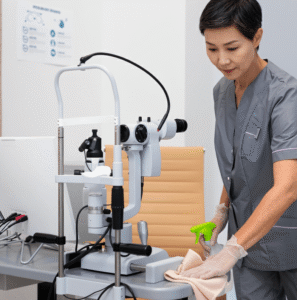Overview
Opportunistic infections (OIs) are infections caused by organisms that typically do not cause illness in healthy individuals, but can become dangerous in people with weakened immune systems. These infections are considered “opportunistic” because they take advantage of a compromised immune defense to grow and spread. They are common in people with conditions like HIV/AIDS, cancer, organ transplants, or those on long-term immunosuppressive therapies. Opportunistic infections can affect nearly any part of the body and often require urgent medical attention.
What is an Opportunistic Infection?
An opportunistic infection occurs when bacteria, viruses, fungi, or parasites that are normally harmless — or kept in check by the immune system — multiply unchecked due to immune suppression. While healthy immune systems can fight off these pathogens easily, immunocompromised individuals are much more vulnerable. OIs can be mild, but often they are severe, chronic, and life-threatening, depending on the organism and the individual’s immune status.
These infections are commonly seen in people with HIV/AIDS, cancer undergoing chemotherapy, post-organ transplant patients, or those taking high-dose corticosteroids or other immune-modulating drugs.
Symptoms
Symptoms of opportunistic infections vary widely depending on the type and location of infection. Common symptoms include:
- Persistent fever
- Fatigue and weakness
- Cough or difficulty breathing
- Chronic diarrhea
- Skin rashes or lesions
- Headaches, confusion, or neurological changes
- Weight loss or poor appetite
- Organ-specific signs (e.g., liver, brain, eye, or GI involvement)
Because OIs can affect multiple organs at once, symptoms are often non-specific, making early detection critical.
Causes
Opportunistic infections are caused by a wide range of microorganisms that normally do not pose a threat to healthy people. Common pathogens include:
- Fungi: Candida, Pneumocystis jirovecii (causing PCP), Aspergillus
- Viruses: Cytomegalovirus (CMV), Herpes simplex virus, JC virus
- Bacteria: Mycobacterium avium complex (MAC), Tuberculosis (TB), Listeria
- Parasites: Toxoplasma gondii, Cryptosporidium, Isospora
The primary cause behind opportunistic infections is immune suppression or immunodeficiency, whether due to disease, medication, or medical procedures.
Risk Factors
Certain individuals are at greater risk of developing opportunistic infections, including:
- People living with HIV/AIDS, especially with CD4 counts below 200
- Cancer patients receiving chemotherapy
- Organ transplant recipients on immunosuppressive drugs
- Individuals on long-term corticosteroid therapy
- Elderly or very young children with immature or weakened immune systems
- People with autoimmune diseases being treated with biologic therapies
- Those with malnutrition or chronic illnesses like diabetes
Complications
Opportunistic infections can lead to a range of complications, including:
- Organ damage (lungs, liver, brain, kidneys)
- Permanent neurological impairment
- Severe wasting and malnutrition
- Sepsis (bloodstream infection)
- Blindness (from CMV retinitis or toxoplasmosis)
- Increased mortality if untreated
- Interruption of cancer or transplant treatments due to infection
Prompt treatment is essential to prevent life-threatening consequences.
Prevention
Preventing opportunistic infections relies heavily on proactive immune system management and minimizing exposure to high-risk pathogens:
- Antiretroviral therapy (ART) for people with HIV to maintain immune function
- Prophylactic medications (e.g., TMP-SMX for PCP, antivirals for CMV)
- Vaccinations for preventable infections (e.g., flu, hepatitis B, pneumonia)
- Good hygiene practices, including food and water safety
- Avoiding environments where dangerous fungi or parasites may live (e.g., soil, animal waste)
- Regular medical check-ups to monitor immune function and catch infections early
Treatment Options in Korea
South Korea provides advanced medical care for immunocompromised patients and those at risk of opportunistic infections. Treatment depends on the specific pathogen and may include:
- Antibiotics, antifungals, antivirals, or antiparasitic medications, often administered intravenously for severe infections
- Immune support: Boosting immune function where possible (e.g., adjusting immunosuppressants or initiating ART)
- Hospitalization and isolation, especially in severe or contagious cases
- Advanced diagnostic testing (e.g., PCR, cultures, imaging) to identify the infection
- Multidisciplinary care teams, including infectious disease specialists, oncologists, and transplant physicians
Major hospitals such as Seoul National University Hospital, Samsung Medical Center, and Asan Medical Center are equipped with cutting-edge laboratories, isolation facilities, and internationally trained infectious disease experts. These centers offer comprehensive care for patients vulnerable to opportunistic infections, including long-term monitoring and prophylaxis.













